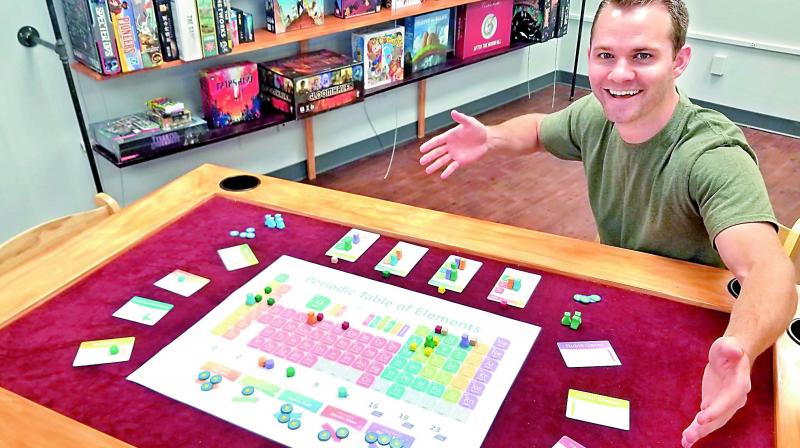A real game changer
John Coveyou has designed several engaging board games to help simplify scientific concepts and make learning easier.

In sharp contrast to a chemistry teacher in a Netflix series who turned meth kingpin, here is a science teacher who launched a board game company to help simplify learning science. John Coveyou, CEO, Genius Games who taught chemistry, biology and physics for a number of years, discovered that many of his students would come to class with an inherent dislike of science, finding it boring, intimidating or plainly incomprehensible. Interestingly, these very students could spout complicated statistics and figures from sci-fi games that they were playing.
That was the trigger for this teacher, who has a Master’s degree in energy, environmental and chemical engineering, to design games that were not only engaging and fun, but also themed around science concepts. He began designing games as a hobby in 2011, and published his first Biology game Kickstarter in 2014. Coveyou has since launched seven games — four around Biology and the rest on Chemistry. His eighth game, currently under manufacture, centers around the periodic table.
Of course, it hasn’'t been an easy ride. “I’ve created around 50 to 100 games more, but none of them made it past development. We have roughly 5 to 10 more games that are actively in the design and development process,” he says.
Each of the games refines a core science process or concept. Cytosis, for instance is a worker placement game that takes place inside a human cell. Players compete to collect macromolecules like mRNA or lipids, and then use them to synthesise hormones, enzymes and receptors to score health points.
Even though he designs the games with hobby gamers and scientists in mind (and there is a lot of overlap here), he also has many teachers and students playing them, he avers.
On how he creates these games, Coveyou explains, “I start off with a science process or core concept in mind that I’m excited about, then spend some time researching so that I have the relevant details fresh in my mind. After that I put together a simple prototype of the game. The important thing at this stage is that the game functions and grows out of that core science concept, although the game is rarely ever actually fun to play at this point!”
Many rounds of play-testing follow while their internal team tries to figure out what doesn’t work, what’s most frustrating and what works well before they start to see where the fun lies.
“Once the game play is more solid, we start playing the prototype at our in-house game nights to get some outside feedback. With every iteration, I create a new prototype that reflects the latest changes. One of the final stages of the development is to start sending the prototype out to our network of play testers and science review teams spread out across the world for their feedback,” he adds.
As science is bound by restrictions, processes and rules, these games are harder to design. With stricter game rules being set by elite scientists from across the world, the most difficult part is maintaining the accuracy of the science while developing game play that’s engaging, rather than just a mechanical walk-through of a science process.
While there are several expansions and children’s games in the pipeline, the next core game is called Nerd Words: Science! This is a social word game where teams compete to figure out a secret science term. There’s a clue giver for each round, who provides related science terms associated with their term as clues, and teams then race to submit their guesses. Incidentally, this will be one of the first word and party games.
English versions of the games are available on the website and ship around the world, while translations will be available through international publishers such as MasQueOco (Spanish) and Schwerkraft-Verlag (German). Coveyou adds, “We are always looking for partners abroad that want to license our games and publish them in their native languages.”
He continues, “Our world is filled with problems that are scientific in nature like difficulty in accessing clean water, energy issues and poverty. There is so much pain caused by sickness or politically-based violence that has at its root, the limitation of resources. A very specific way that some of that can be relieved is through scientific research and innovation, like finding ways to innovate for clean water, energy and the like. But that’s just not going to happen if kids think that science is irrelevant or intimidating and they want to just have fun and play games instead.”
“My goal is to get the next generation excited about science and I’m hoping that our games will encourage them to look at the issues that face them as challenges that they can overcome, and not as problems that someone else will take care of,” he says on a parting note.

